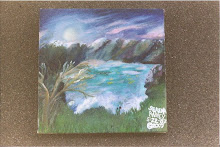I've heard it one time too many and can't listen another time without saying something.
Please don't confuse "flaunt" with "flout". To flaunt something is to show it off. If you flaunt my advice you are proud of it. If you flout it, I can't do anything for you.
It's easy. "Flaunt" puts a thing "on" and wears it proudly. "Flout" throws it "out" in disdain, and ignores it.
I know languages change and grow. But they also change and die. If English dies, we have no replacement. Most Americans don't speak Spanish today. Business Spanish doesn't count. It can't translate Dante. It can only do business. Arabic is the tongue of a very different way of thinking. To learn it would challenge almost all of us. Mandarin, even more so. I would love to switch America to a Celtic language, but since it's this hard just to hold onto a scrap of memory of what English sounded like when words all meant different things, I have little hope of getting gum-snapping strangers across counters to want to learn the declensions of Gaelic nouns and their exceptions.
So we must cling to this life raft we have, battered as it may be, this raft of words tied together by straggling strands of grammar in this storm.
Strand One: Parts of speech are different. The noun (name) is a person, place or, broadly defined, thing. I will tell you all the words I know. Here the nouns are bold.
The verb (word) tells of a deed or action. Don't go out in the street where the cars speed and you can't see where they come from.
The adjective (attributive) describes. Long hours and monotonous work are terrible for one's mental state.
The adverb (added word) describes a verb or adjective. it's a kind of second-generation adjective. It doesn't have to end in -ly and not every word ending in -ly is one. Finally, we meet again.
The article (thing) is what tells people which one you mean. That man said to the cashier that he wanted a bag for these socks.
The particle (little bit) fills in where words no longer change forms. the verb to do has become an interrogative particle and an auxiliary (helping) negative particle. Do you know what an interrogative particle is? It's just a little word that helps make a question. Does that help? Don't hesitate to say something if you still don't understand. Do is also an emphatic particle. You may not think you know what emphatic means, but I think you do.
Will, which really means "want", has become our future particle. Would is the past tense of will. Verbs have tenses. That means we hold them in different positions, toward the past, present, future and beyond. Nouns go in cases. Shall is the real future particle but we hardly ever use it anymore because it preserved a distinction between what we intended and what we just expected, and that was depressing. Should is the past tense of shall. Pull it back into the present and it becomes shall again.
Shall we discuss grammar further someday?
I think I would like that.
Tuesday, April 1, 2008
Subscribe to:
Comments (Atom)




